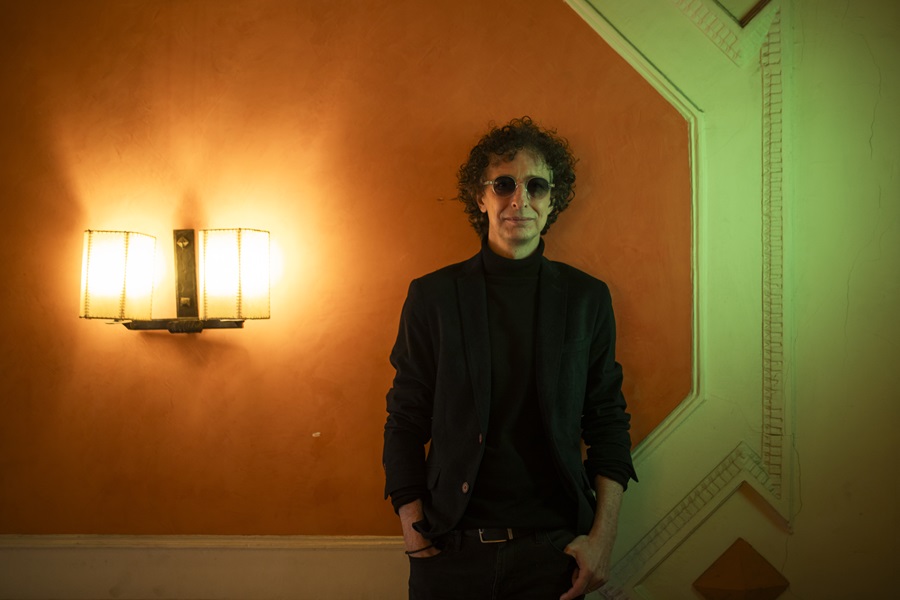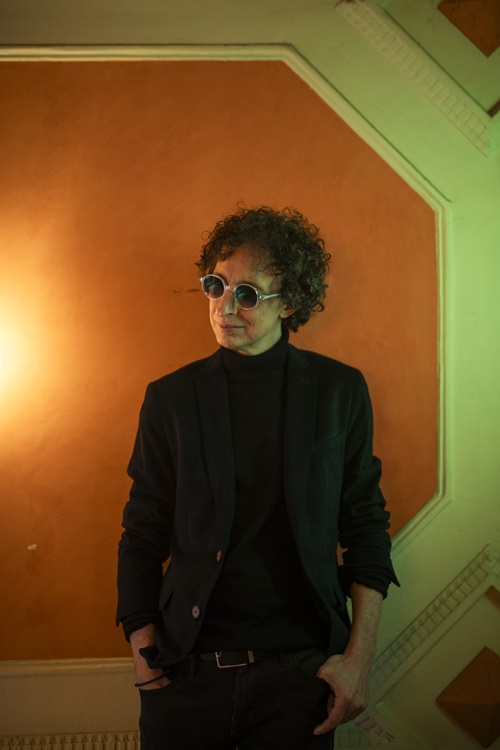- Face to face
- 9 de September de 2024
- No Comment
- 13 minutes read
Eduard Iniesta: “The work of a creator requires a lot of discipline”

FACE TO FACE WITH …
Eduard Iniesta, musician, composer and performer
Eduard Iniesta: “The work of a creator requires a lot of discipline”


Speaking with this restless composer is quite an experience. Just watching how he expresses himself with his eyes, hands, and lips, it seems as though Eduard Iniesta is hanging and rearranging notes on a staff, even conducting a group of musicians playing. But the truth is, Eduard is pure enthusiasm, full of creativity and a desire for change. We shared this spirit during many recesses at school. He was born in Barcelona in 1968, and I in 1967, so there was a year between us. As a result, we didn’t share the same classroom or group, as we were on different levels despite sharing the common space and time during recess.
These were times at the Escolapios on Diputación Street, almost forgotten until a reunion of former students brought us together again in November 2018. Since then, we have maintained contact, rediscovering time and again that boy turned composer who tells me he has always avoided monotony. Even when playing for Dagoll Dagom, he began to feel empty inside from repeating the same notes every day. In short, Eduard is “a restless soul,” a free spirit who needs creativity to breathe and gets bored even with his own language. That’s why, with each new album, he changes direction, even altering the style of the cover. The latest one, for example, was supposed to be done by Ibáñez, but unfortunately, the great comic artist passed away.
Eduard, could you tell us the details of your latest project?
La Comunitat is the work where I clearly set aside the guitars to focus on the voice, which serves the stories I tell. I took charge of the guitars, bass, piano, vocals, synthesizers, and backing vocals, except for the drums and percussion, which were performed by Toni Pagès.
How did La Comunitat come about?
It was born from the need to reflect the times we are living in, offering a snapshot of them, but at the same time, I propose a suggestion, an effective antidote. The residents of an apartment block in any city are the protagonists of La Comunitat. The songs, co-written with my brother Xavier, explore and describe feelings while speaking of desire, boredom, loneliness, frustration, misunderstanding, miscommunication and, above all, love as an ancient balm and antidote for these “wounds” of time.
How long did you spend building this “Community”?
It was a year-long process of composition and recording, which I started after premiering the music for the award-winning show ODISSEA at the Mercat de les Flors and Teatros del Canal in Barcelona. It’s important to mention that for the first time, I worked with a producer with whom I shared the production: Roger Rodés, winner of the 2021 Latin Grammy (Rosalía, Nathy Peluso, Shakira, Love of Lesbian…), with the goal of consolidating the desired sound. On the other hand, I should tell you that the cover of La Comunitat was supposed to be illustrated by the legendary Francisco Ibáñez, but he passed away. Finally, it was masterfully done by filmmaker Juan Millares, along with the inner images of the booklet.
What positive connections would you establish between your professional projects and the educational training you received?
The work of a creator requires a lot of discipline, perseverance, and dedication. These elements were undoubtedly the best legacies of my educational stage. Sooner or later, they will show you the kindest and most satisfying face of the craft, and you will smell success. You’ll think you’re flying, that you can conquer the world, and that it will last forever.

Does success kill success, perhaps?
Yes, and perhaps it doesn’t need to be public success. Personal success might be enough. Maybe you’ll be satisfied with that success, but beware—the same craft will eventually end that sublime state, and you’ll fall with the heavy weight of gravity in a crash of histrionic and dissonant chords.
What do you do when you see you’re no longer in tune?
When that inevitably happens, you would have done well to anticipate it and to have developed effective resilience, allowing you to continue. And you’ll rise. And you’ll fall again. And that’s how it goes. This is the most significant lesson my education left me with. Because studying an instrument often means confronting your limitations until they cease to be, and when that happens, you find new ones, and so on, without limit.
The current educational system receives a lot of criticism. If you had been trained under today’s system, would this have improved or worsened your professional activity?
I can’t deeply evaluate the current educational system, which I don’t know well. But I come from a time when, aside from school classes, you tried to emulate the notes of instrumental solos from your role models and find a particular sound by actively educating your ear, listening and rewinding the cassette tape that held your favourite solo until you could reproduce it.
Repetition, effort, and dedication?
True, and working primarily with the few auditory references available back then. Nowadays, you have unlimited materials to improve: YouTube videos, Aebersold books, and a lot of sophisticated digital technology that makes the work easier while confining you to a dangerous comfort zone. But that’s another topic.
Why?
Because these are very attractive tools that make studying enjoyable but reduce effort and creativity. For example, Aebersold books give you a backing band to accompany you while you practice. This allows you to set a higher study exhaustion limit. The consequence is that you spend more time. On the other hand, having a YouTube video of someone showing you how to play a passage allows you to replay the explanation as many times as you want. You just have to choose the right video. And this without mentioning the vast amount of music available through streaming networks, allowing you to access a lot of music that, in my time, was difficult to obtain (imported records, a friend’s trip bringing back a record, etc.).
So, do all these tools really help? Or do they hinder creativity?
All these tools are great supplements to the lessons you receive. But beware, they are like dietary supplements that should never replace the food, which is to say, academic training. Otherwise, you risk adopting imperfect techniques that will hinder your learning. I think they should be used in moderation.
“Music is essential to being human. Everyone should have a musical education. This doesn’t mean everyone needs to play an instrument”
Considering your professional path, how do you think the current education system could be improved?
Music is essential to being human. Everyone should have a musical education. This doesn’t mean everyone needs to play an instrument. At an early stage, general music education should focus on sensitizing the student. We need to let them experience the joys of listening to music, paying attention, participating…
Savouring the music from a young age…
Because there may come a time when music captivates you. There’s always something that triggers it, and if it doesn’t happen spontaneously or easily, every effort should be made to facilitate it.
How do you achieve that?
By making them listen to a lot of music, engaging with the stimuli it provokes, enjoying it. Just as there are readings that are part of the software, there should also be listening exercises. Listen to this album or that one. Go to this concert or another. And then discuss it in class. I mean, in primary education, you can’t expect students to learn to play an instrument as challenging as the flute or even a ukulele if there hasn’t been this groundwork first or alongside it. From there, each person should integrate music into their life at the level they choose, but it should be there.
On another note, I would also teach them that there is functional music to enjoy at a party and, ultimately, music to listen to, enjoy, and disseminate. It’s necessary to learn to appreciate both and distinguish between them. It’s also very important for public and private audiovisual media to participate in this goal by creating content aligned with these educational goals. Only in this way we will manage to have a majority of the audience with a certain level of musical taste.
Composer, singer, and performer of a unique and emotive music with a distinctive style and strong personality. He considers himself a wild, free musician, always in constant motion, with his music passing through two distinct stages.
The first stage involved classical and “world music” training during his first 25 years. Iniesta was considered a reference in Mediterranean music, though he acknowledges this period was marked by a vital need to resist committing to a single musical style, remaining open to exploring the entire musical universe to continue growing and existing.
From this period, notable achievements include the Enderrock award for his album Andròmines, the Enderrock award for the production and arrangements of Marina Rossell canta Moustaki, the Barnasants award for Els Set Pecats (The Seven Sins); orchestral compositions such as El Gos Solitari de Mozart (Mozart’s Lonely Dog) with Joan Margarit or La petita casa de mi mateix (The Little House of Myself) by Joan Vinyoli; artistic collaborations with Mercè Sampietro, Lluís Soler; music for theatre such as 9 maletes (9 Suitcases) by Joaquim Oristrell, Mi alma en otra parte (My Soul Somewhere Else) with the Centro Dramático National, Canigó by Verdaguer, or The Odyssey by Homer; contributions to soundtracks for film, television, advertising, classical music, and dance with companies like Dagoll Dagom, Universal Teatro, La Perla 29, the Orquesta del Gran Teatro del Liceo, and the Orquesta Sinfónica de Barcelona, among others. He also composed the music for the dance show Odissea, which won the Butaca award for Best Dance Show in 2023.
In addition to all the above, we can mention his contributions and involvement in 258 recorded productions; concerts and tours with artists from diverse styles like Javier Camarena or María del Mar Bonet, or musical direction and arrangements for successful shows such as Big Bang Beethoven (9 years at the Palau de la Música and still running) or Ma, me, mi…Mozart (16 years at the Barcelona Auditorium and still running). In short, there’s a long list of works that form a multifaceted web in search of a sound that seeks and seeks, born from the fusion of the main styles he has developed. He has even named this new sound: “synthesis.”
In 2020, with the release of his album Trajecte Animal, he began a second phase where this “synthesis” is already a reality. This synthesis turns out to be a refined, elegant, and sensitive authorial pop where urban chronicle songs blend with Mediterranean pigments, and fully rock attitude and textures. This work allowed him to delve into this second period, which began in 2022 with a celebratory concert of his 25-year career at the Palau de la Música in Barcelona. In 2024, he released La Comunitat, receiving excellent reviews and, so far, considered the best album of the month by Jordi Bianciotto in Revista Enderrock. If you listen to it, you’ll find it’s lyrical pop-rock where the voice is very present with a message: society is disconnected, and love is the antidote.
Source: educational EVIDENCE
Rights: Creative Commons

